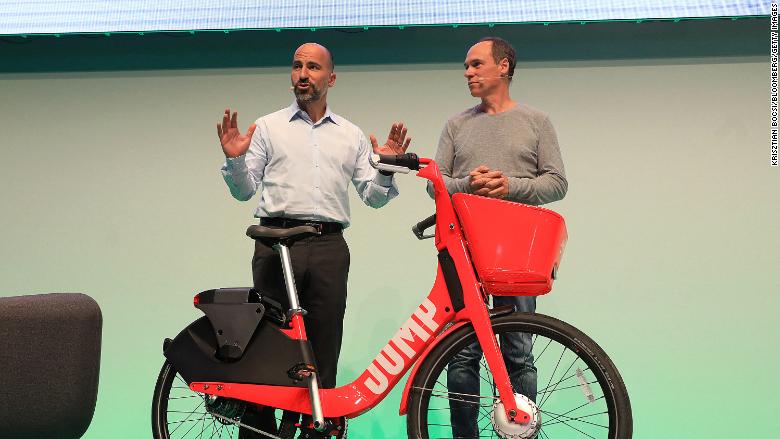During rush hour, it is very inefficient for a one-tonne hunk of metal to take one person ten blocks.
Who said that? An urban planner? An environmentalist? Someone involved with a bike-share program?
That last answer would be the right one, sort of. Dara Khosrowshahi is the CEO of the company that acquired bike-share startup Jump Bikes.
And that company is...Uber. Yes, the ride-share company: one of the companies responsible for clogging the streets of cities like New York with drivers who pull over, seemingly without warning or regard for pedestrians or cyclists. (I've had a couple of near-misses with Uber drivers who were looking at their screens instead of what (or who) was outside of their windows.) Believe it or not, they're not only getting into bike share, they will soon offer electric scooters in San Francisco and other cities.
So, what brought about Mr. Khosrowshahi's seeming apostasy? As he told The Financial Times, "There's a $6 trillion mobility market, and no one product is going to be serving that whole market." So, while shifting some of the company's resources from drivers to cycling or scooters may hurt profits for a little while, it will pay off in the long run by giving people more options.
Interestingly, he says some Uber drivers are even embracing the idea. The reason, he says, is that bicycles would reduce the demand for short rides and leave drivers to complete longer, more lucrative runs, such as rides to airports.
And, unlike yellow cabs, Uber drivers don't make money if they're stuck in traffic: Usually, they are paid a fixed or agreed-upon amount of money for a trip, regardless of whether it takes 10 minutes or an hour. Yellow cabs, on the other hand, have meters that continue to run whether the car is zipping down a side street or idling on the Long Island Expressway. (How can it be an "expressway" if the traffic isn't moving? Its acronym, the LIE, is more apt.)
So, as Khosrowshahi says, driving a tonne of metal ten blocks isn't a very efficient way to transport one passenger--from a transportation, environmental or economic standpoint. Ultimately, it doesn't even help the drivers' bottom lines. More bikes, fewer cars, less congestion and pollution...because of Uber? Who knew?
Who said that? An urban planner? An environmentalist? Someone involved with a bike-share program?
That last answer would be the right one, sort of. Dara Khosrowshahi is the CEO of the company that acquired bike-share startup Jump Bikes.
And that company is...Uber. Yes, the ride-share company: one of the companies responsible for clogging the streets of cities like New York with drivers who pull over, seemingly without warning or regard for pedestrians or cyclists. (I've had a couple of near-misses with Uber drivers who were looking at their screens instead of what (or who) was outside of their windows.) Believe it or not, they're not only getting into bike share, they will soon offer electric scooters in San Francisco and other cities.
So, what brought about Mr. Khosrowshahi's seeming apostasy? As he told The Financial Times, "There's a $6 trillion mobility market, and no one product is going to be serving that whole market." So, while shifting some of the company's resources from drivers to cycling or scooters may hurt profits for a little while, it will pay off in the long run by giving people more options.
 |
| Uber CEO Dara Khosrowshahi presenting Jump Bicycles in Berlin, Germany. |
Interestingly, he says some Uber drivers are even embracing the idea. The reason, he says, is that bicycles would reduce the demand for short rides and leave drivers to complete longer, more lucrative runs, such as rides to airports.
And, unlike yellow cabs, Uber drivers don't make money if they're stuck in traffic: Usually, they are paid a fixed or agreed-upon amount of money for a trip, regardless of whether it takes 10 minutes or an hour. Yellow cabs, on the other hand, have meters that continue to run whether the car is zipping down a side street or idling on the Long Island Expressway. (How can it be an "expressway" if the traffic isn't moving? Its acronym, the LIE, is more apt.)
So, as Khosrowshahi says, driving a tonne of metal ten blocks isn't a very efficient way to transport one passenger--from a transportation, environmental or economic standpoint. Ultimately, it doesn't even help the drivers' bottom lines. More bikes, fewer cars, less congestion and pollution...because of Uber? Who knew?